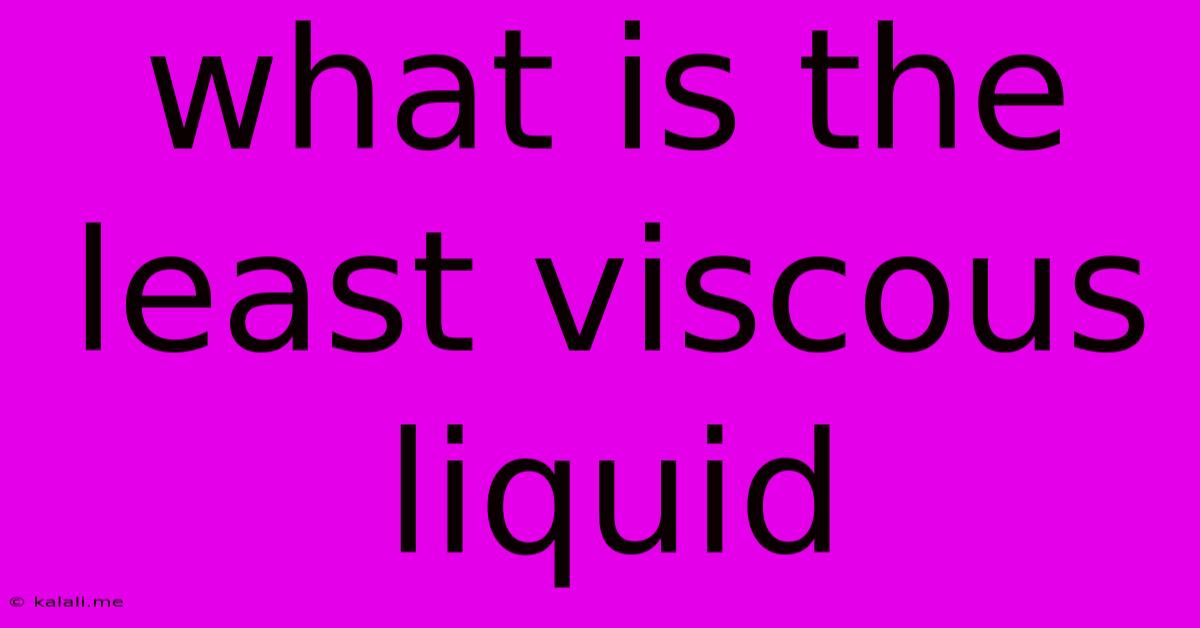What Is The Least Viscous Liquid
Kalali
Jun 14, 2025 · 3 min read

Table of Contents
What is the Least Viscous Liquid? A Deep Dive into Fluid Dynamics
This article explores the fascinating world of viscosity and identifies the liquids with the lowest viscosity known to science. Understanding viscosity is crucial in various fields, from engineering and manufacturing to medicine and everyday life. We'll delve into the definition of viscosity, explore factors affecting it, and finally, pinpoint the contenders for the title of "least viscous liquid."
Viscosity, simply put, is a measure of a fluid's resistance to flow. High viscosity means a fluid flows slowly (like honey), while low viscosity means it flows easily (like water). Several factors influence a liquid's viscosity, including temperature, pressure, and molecular structure. Generally, lower temperatures lead to higher viscosity, while higher temperatures decrease it. Similarly, stronger intermolecular forces result in higher viscosity.
So, what liquids boast the lowest viscosity? The answer isn't as straightforward as one might think. Precise measurements at extremely low viscosities become increasingly challenging. However, several liquids consistently appear at the top of the list:
Contenders for the Least Viscous Liquid:
-
Superfluid Helium (Helium II): At extremely low temperatures (below 2.17 Kelvin), helium transitions into a superfluid state exhibiting zero viscosity. This extraordinary state allows it to flow without any resistance, defying classical physics. While technically a superfluid and not strictly a liquid in the traditional sense, its properties make it the ultimate contender for the least viscous substance. It's important to note that achieving and maintaining this state requires highly specialized equipment.
-
Liquid Hydrogen: With a significantly lower viscosity than water, liquid hydrogen is extremely cold and requires specialized handling due to its cryogenic nature. Its low viscosity makes it useful in certain applications, although its extreme cold presents significant logistical challenges.
-
Liquid Neon: Similar to liquid hydrogen, liquid neon exhibits relatively low viscosity compared to more common liquids like water or oil. Its low viscosity is a contributing factor to its use in certain cryogenic applications.
-
Certain Gases (at high temperatures): While gases are not typically considered liquids, it's important to remember that viscosity is a property of fluids in general. Some gases at extremely high temperatures can exhibit remarkably low viscosity due to the increased kinetic energy of their molecules, reducing intermolecular interactions.
It's crucial to understand that the precise ranking of these liquids depends on temperature and pressure. The viscosity values change dynamically with these parameters. Therefore, declaring a single definitive "least viscous liquid" is difficult without specifying the exact conditions.
Understanding Viscosity's Importance:
The viscosity of liquids plays a vital role in numerous applications:
- Lubrication: Low-viscosity lubricants are essential for reducing friction in engines and machinery.
- Fluid Dynamics: Understanding viscosity is fundamental in designing efficient pipelines, pumps, and other fluid-handling systems.
- Medicine: Blood viscosity affects cardiovascular health, and understanding its properties is critical in diagnosing and treating various conditions.
- Manufacturing: The viscosity of paints, inks, and other coatings significantly impacts their application and final quality.
In conclusion, while a definitive "least viscous liquid" is difficult to declare without specific conditions, superfluid helium, in its superfluid state, displays properties consistent with zero viscosity. Liquid hydrogen, liquid neon, and certain gases at high temperatures also demonstrate exceptionally low viscosity, showcasing the diverse world of fluid dynamics and the crucial role viscosity plays in various scientific and industrial applications. Further research and technological advancements will continue to refine our understanding of these extreme properties.
Latest Posts
Latest Posts
-
Which Of The Following Defines The First Law Of Thermodynamics
Jun 15, 2025
-
25 Of What Number Is 6
Jun 15, 2025
-
Difference Between High Pass Filter And Low Pass Filter
Jun 15, 2025
-
Differentiate Between Monohybrid Cross And Dihybrid Cross
Jun 15, 2025
-
Which Of The Following Are True About Language
Jun 15, 2025
Related Post
Thank you for visiting our website which covers about What Is The Least Viscous Liquid . We hope the information provided has been useful to you. Feel free to contact us if you have any questions or need further assistance. See you next time and don't miss to bookmark.